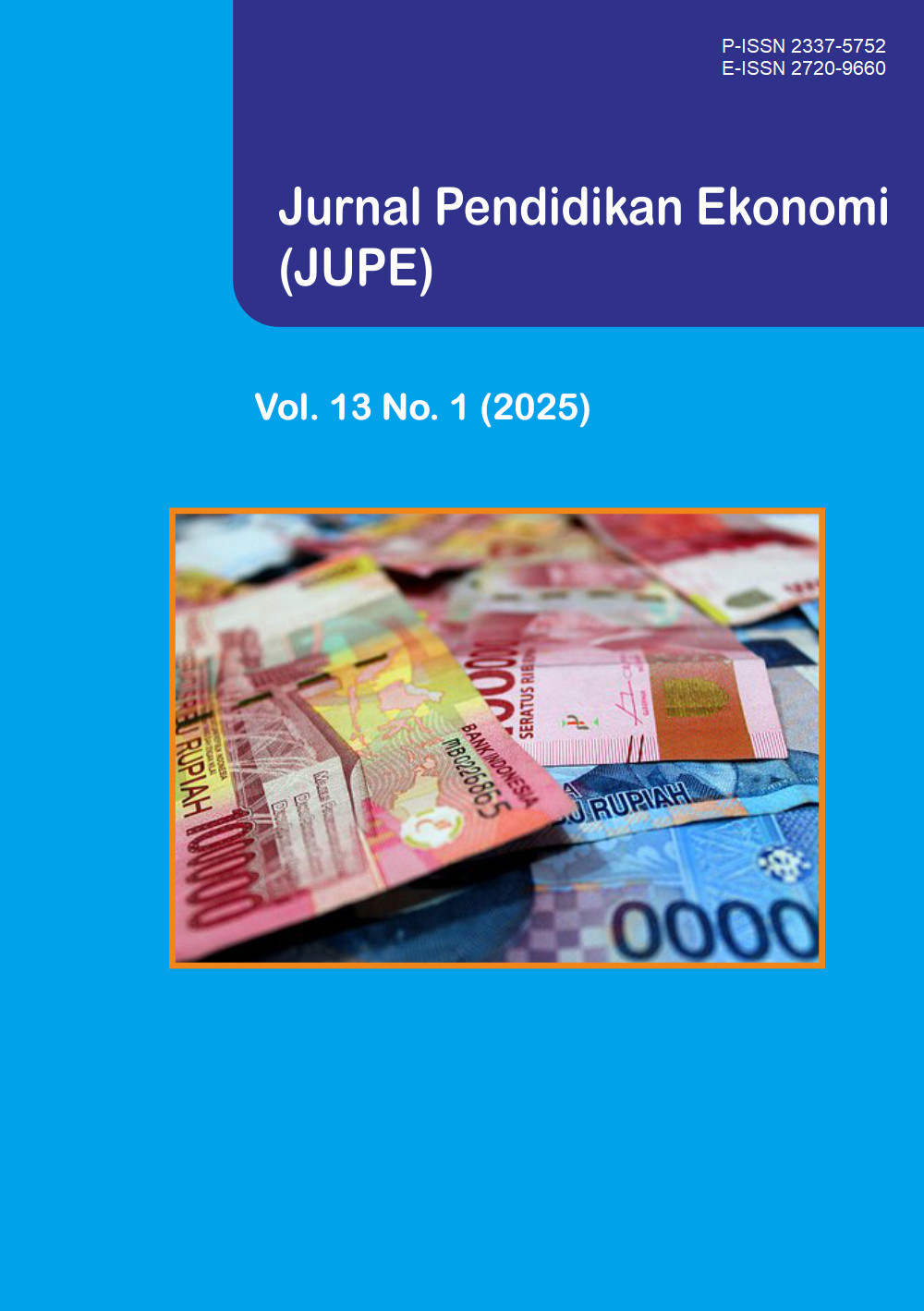Evaluasi pendidikan ekonomi informal dalam keluarga: Dampak sosial ekonomi terhadap metode dan nilai yang ditanamkan
DOI:
https://doi.org/10.26740/jupe.v13n1.p57-67Keywords:
Informal Economic Education, Family, Socioeconomic Status, Economic ValuesAbstract
Informal economic education within families serves as a crucial foundation that shapes children's economic mindset from an early age. This study explores how parents' socioeconomic status influences teaching methods and the economic values instilled in their children. The research involves six families in Surabaya representing low, middle, and high socioeconomic classes. The evaluation employs the CIPP (Context, Input, Process, Product) model to analyze the relevance, resources, implementation, and outcomes of informal economic education. The findings reveal significant differences: families with higher socioeconomic status tend to use more complex methods, such as critical dialogue and strategic role modeling. Meanwhile, middle-class families rely on habit formation and dialogue to build financial management understanding. In contrast, families with lower socioeconomic status focus more on basic role modeling and simple habit-building. This study recommends that all parents enhance their awareness of the importance of economic education and apply methods tailored to their circumstances. Furthermore, there is a need for more inclusive and accessible formal economic education programs to support families across all socioeconomic levels in developing more effective teaching methods.Downloads
References
Abriyanto, F. & Barusman, T. M. (2024). The Influence of Financial Literacy, Socioeconomic Status of Parents and Lifestyle on Student Financial Behavior. IJEBIR, Volume 03 Issue 02, 2024.
Amala, I. A. & Megasari, R. Student economic rationality analysis in the digital age reviewed from cashless society and financial education. Business, Economic and Sustainability Science (BESS), 2022, Sciendo, pp. 102-108. https://doi.org/10.2478/9788366675711https://doi.org/10.2478/9788366675711-012
Asadi, K., Yousefi, Z., Mahdad, A. (2023). The Role of Family in Shaping Financial Literacy and Economic Behavior. Journal of Psychosociological Research in Family and Culture, 1:3 (2023) 22-29. https://doi.org/10.61838/kman.jprfc.1.3.4
Ayuningtyas, T. (2014). Pengaruh Pendidikan Ekonomi di Keluarga, Pembelajaran Ekonomi di Sekolah terhadap Perilaku Konsumsi yang Dimediasi oleh Prestasi Belajar. Tesis Tidak Diterbitkan. Malang: PPS UM.
Baharuddin. (2008). Teori Belajar dan Pembelajaran. Yogyakarta: Ar-Ruzz Media.
Bandura, A. (1977). Social Learning Theory. New York: General Learning Press.
Baskoro, J. T., Wijayanti, S. H., Triwarmiyati, M. (2022). Upaya Meningkatkan Kemampuan Literasi Melalui Pembiasaan. Seminar Nasional Hasil Penelitian dan Pengabdian Kepada Masyarakat 2022, Jakarta, 20 Oktober 2022.
Bertens, K. (2002). Pengantar Etika Bisnis. Yogyakarta: Kanisius.
Creswell, J. W. (2015). Penelitian Kualitatif & Desain Riset. Yogyakarta: Pustaka Pelajar
Edin, K. & Lein, L. (1997). Making Ends Meet: How Single Mothers Survive Welfare and Low-Wage Work. New York: Russell Sage Foundation.
Fadhila, N. (2019). Makna Pendidikan Ekonomi Informal Bagi Keluarga Petani Di Desa Domasan Kecamatan Kaliwadir Kabupaten Tulungagung. Fakultas Ekonomi, Universitas Negeri Malang.
Ginanjar, Y., Achmadi, & Okiana. (2016). Analisis Rasionalitas Ekonomi Mahasiswa Pendidikan Ekonomi FKIP Untan Pontianak. Jurnal Pendidikan dan Pembelajaran Khatulistiwa, Vol 5, No 5. DOI: http://dx.doi.org/10.26418/jppk.v5i5.15107
Haiqal, M. R., Bintari, W. C., Hidayah, N. (2024). Pengaruh Literasi Keuangan dan Gaya Hidup terhadap Minat Mahasiswa Menggunakan Paylater (Studi Pada Mahasiswa Universitas Muhammadiyah Sorong). Scientific Journal of Economics, Management, Business, and Accounting, Vol. 14 No. 02 Year of 2024. https://e-journal.uniflor.ac.id/index.php/analisis/article/view/4548/2628
Hasan, M. (2018). Pendidikan Ekonomi Informal: Bagaimana Pendidikan Ekonomi Membentuk Pengetahuan pada Bisnis Keluarga. Jurnl Ekonomi dan Pendidikan, 1(2),30. DOI: https://doi.org/10.26858/jekpend.v1i2.7262
Hasbullah. (2009). Dasar-Dasar Ilmu Pendidikan. Jakarta: Raja grafindo Persada.
Helmawati. (2016). Pendidikan Keluarga. Bandung: PT Remaja Rosdakarya.
Indriasih, S. & Mulyani, D. (2021). Cerdas Memahami dan Mengelola Keuangan bagi Masyarakat di Era Informasi Digital. Surabaya: Scopindo Media Pustaka.
Irbah, A. N., Munastiwi, E., Riyadi, A. S. M., Binsa, U. H. (2022). Peran Orang Tua dalam Membangun Financial Education pada Anak Usia Dini. WISDOM: Jurnal Pendidikan Anak Usia Dini, Volume 03 No.02.
Lareau, A. (2011). Unequal Childhoods: Class, Race, and Family Life. University of California Press.
Latif, I. (2019). Evaluasi dalam Proses Pembelajaran. Adaara, Volume. 9, No. 2 Agustus 2019.
Manek, A. M. (2020). Pendidikan Ekonomi Informal Masyarakat Adat Loona. Pascasarjana Pendidikan Ekonomi, Universitas Negeri Malang.
Mizal, B. (2014). Pendidikan dalam Keluarga. Jurnal Ilmiah Peurdeun, Vol. 2 No. 3 September 2014.
OJK. (2023). Laporan Kinerja OJK Triwulan I 2023. https://www.ojk.go.id/id/berita-dan-kegiatan/info-terkini/Documents/Pages/Laporan-Kinerja-Triwulan-I-2023/Laporan%20Kinerja%20OJK%20Triwulan%20I%202023.pdf. Diakses pada 2 November 2024.
Piff, P. K., Kraus, M. W., Côté, S., Cheng, B. H., Keltner, D. (2010). Having Less, Giving More: The Influence of Social Class on Prosocial Behavior. Journal of Personality and Social Psychology, 2010, Vol. 99, No. 5, 771–784. https://doi.org/10.1037/a0020092
Pratiwi, M.B. & Wahyono, H. (2024). Studi Fenomenologi: Peran Pendidikan Ekonomipada Keluarga Pemilik Toko Kelontong Untuk Menumbuhkan Jiwa Wirausaha Anak. Jurnal Pembelajaran, Bimbingan, dan Pengelolaan Pendidikan, 4(4), 2024.
Pusat Pelaporan dan Analisis Transaksi Keuangan. (2023). Transaksi Mencurigakan Perjudian PPATK. https://www.ppatk.go.id/. Diakses pada 2 November 2024.
Puspitawati, H. (2010). Pengaruh Karakteristik Sosial Ekonomi Keluarga terhadap Pola Asuh Belajar Siswa Sekolah Dasar dan Menengah Pertama. Jurnal Ilmu Keluarga dan Konsumen, 3(1), 46-55.
Risnawati, R. & Wardoyo, C. (2018). Pengaruh pendidikan ekonomi keluarga, gaya hidup, modernitas individu, dan literasi ekonomi terhadap perilaku konsumtif siswa. Jurnal Pendidikan: Teori, Penelitian, dan Pengembangan, 3(4), 430-436.
Rizky, A. Z. A. (2021). Hubungan Antara Empati dengan Perilaku Altruisme pada Mahasiswa Fakultas Psikologi Universitas 17 Agustus 1945 Surabaya. Skripsi, Universitas 17 Agustus 1945 Surabaya. URI: http://repository.untag-sby.ac.id/id/eprint/8289
Soraya. (2013). Pengaruh Pembiayaan Pendidikan Oleh Orang Tua Terhadap Prestasi Belajar Siswa Kelas X Sma Negeri. Pontianak: Universitas Tanjungpura.
Stufflebeam, D. L. & Shinkfield, A. J. (1986). Systematic Evaluation: A Self-Instructional Guide to Theory and Practice. Boston: Kluwer-Nijhoff Publishing.
Taluke, J., Lesawengen, L. Suwu, E. A. A. (2021). Pengaruh Status Sosial Ekonomi Orang Tua terhadap Tingkat Keberhasilan Mahasiswa di Desa Buo Kecamatan Loloda Kabupaten Halmahera Barat. Jurnal Holistik, Vol. 14 No. 2.
Wahyono, H. (2001). Pengaruh Perilaku Ekonomi Kepala Keluarga terhadap Intensitas Pendidikan Ekonomi di Lingkungan Keluarga. Disertasi Tidak Diterbitkan. Malang: UPT PPS Universitas Negeri Malang.
Wardani, V. K. & Amala, I. A. (2024). The Influence of Financial Literacy, Perceived Ease of Use, and Habit on Generation Z's Interest in Using Mobile Payments. Kuala Lumpur International Communication, Education, Language and Social Sciences 23rd (KLiCELS 23), 29 -30 June 2024, Physical and Online Conference.
Yasinta, T., Firdaus, Nurhayati, Khoirunnisa, Hartono, J. S. (2024). Pengembangan Literasi Keuangan Anak Usia Dini melalui Praktik Menabung di Penang Malaysia. Society: Jurnal Pengabdian Masyarakat, Vol. 3, No. 4. https://edumediasolution.com/index.php/society
Downloads
Published
How to Cite
Issue
Section
License
Copyright (c) 2025 Vindi Kusuma Wardani, Istiqomah Ahsanu Amala (Author)

This work is licensed under a Creative Commons Attribution-NonCommercial 4.0 International License.
Copyright
- Authors retain copyright and grant the journal right of first publication with the work simultaneously licensed under a Creative Commons Attribution License that allows others to share the work with an acknowledgment of the work's authorship and initial publication in this journal.
 Abstract views: 246
,
Abstract views: 246
, PDF Downloads: 277
PDF Downloads: 277











